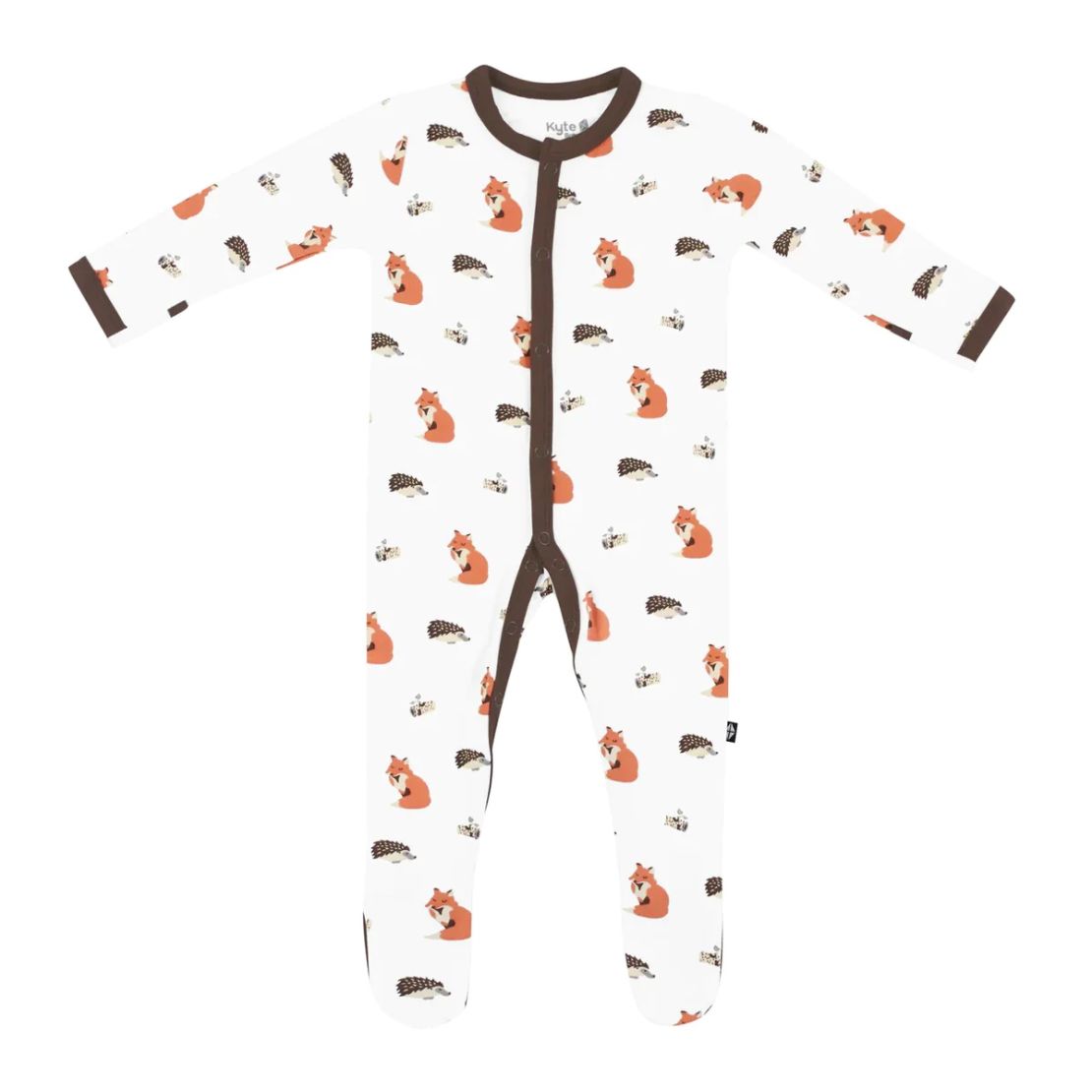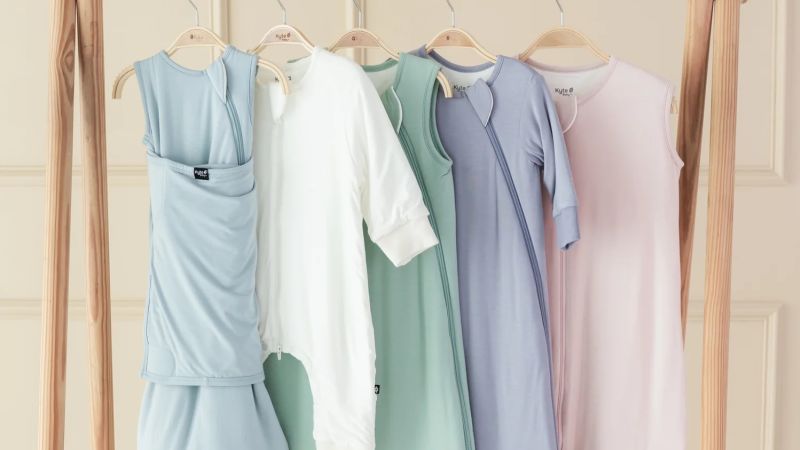Emilee Hobbs, a TikTok creator from Georgia, is a self-proclaimed Bamboo Mom.
Brands selling bamboo fiber baby clothes have gone viral in recent years, prompting a staunch community of “Bamboo Moms” — parents and caregivers who exclusively dress their children in the fabric. Hobbs says she owns 120 pieces of bamboo fiber baby pajamas, which can run from $32 to $38 for brands such as Bums & Roses, Posh Peanut and Kyte Baby. (In contrast, onesies from Carter’s typically retail for $12 to $15.).
Hobbs’ mother, a neonatal intensive care unit nurse, first purchased the onesies; Hobbs’ son has eczema-prone skin.
Bamboo moms “just get it,” Hobbs said. “Other moms will be like, ‘that’s too much, why would you spend that much?’ It’s different when you’re in a group with like-minded people.’”
There are a number of bamboo clothing brands. But one store Hobbs said she won’t be shopping at again, even though she says she owns many of their pieces: Kyte Baby.
Momfluencers sent children’s clothing brand Kyte Baby soaring. But now, after high-profile missteps around an employee seeking to work from home to care for a hospitalized baby and a botched CEO apology, these same passionate fans could bring the company back down to earth.
Hobbs has found a supportive community online, but says, “There’s a whole other extreme of bamboo moms, their whole kids’ wardrobe is that. That’s a serious niche.”
Last week, the CEO of Kyte Baby posted a TikTok apology after word got out that the company denied an employee’s request to work remotely while her baby was in a neonatal intensive care unit. Fans slammed the company for the decision, calling it anti-working mom and against the brand’s carefully cultivated parent-friendly image.
After fans called the apology disingenuous, founder Ying Liu then followed up with a second TikTok, this time apologizing for how detached and scripted the first video sounded.
The swift backlash to Kyte Baby was just as strong as its fans’ devotion had been. One person filmed themselves flinging away a Kyte Baby onesie into the snow in protest to ’N Sync’s “Bye Bye Bye.” Others said they would be selling their Kyte Baby items. Many commentators suggested switching to rival brands.
“I didn’t think the first apology was sincere,” Hobbs said. “I don’t see myself purchasing again because of this.”
However, many mothers said they would be keeping their existing clothing.
“My mother and I have spent hundreds of dollars on Kyte Baby, and I cannot bring myself to just waste all of that,” Hobbs said in a TikTok video that has racked up almost 2.5 million views.
Being a Bamboo Mom (or parent) isn’t just a consumer choice. For many, it’s an identity.
Designer children’s pajamas are more than status symbols. Few relationships or parts of a person’s ego are stronger than being a mother, Northwestern University senior marketing lecturer Jacqueline Babb said. And buying naturally sourced, nurse-recommended onesies can show off what kind of mother you are to not only your peers but to your social media followers as well.
“You are a ‘good mom’ because you are buying this product that is superior for your baby,” Babb said.
These companies say bamboo fabric is baby soft, cooler than cotton and better for skin. And Kyte Baby, with its monochromatic pastels and prints with names like “sienna woodlands,” is among the brands that dominate the bamboo market.

TikTok and Instagram introduced Sunni Son in Arkansas to bamboo clothing, and she was gifted a few items for her baby shower.
“I just saw the price tag. I had no idea there was a world within the world of bamboo,” she said.
Son said she’s bought most of her bamboo fiber collection secondhand. The clothing stretches and grows with her child, who she says is in the 99th percentile in his age for height.
But quickly, Son noticed the cult following surrounding some of these brands, especially Kyte.
The company’s Facebook group alone has over 100,000 members, with moms showing off their babies in pajamas that often cost more than various brands for adults. There are endless tips and tricks to shopping annual sales, where items quickly fly off the virtual shelves.
And like trendy designer brands (think Telfar’s designer purses), Kyte has merchandise drops for different seasons, releasing pastels in spring or jack-o-lantern prints in the fall.
The drops create a “kind of hysteria,” Son said. “People just get obsessed.”
Much like classic collectible items like Beanie Babies, Kyte also announces when they will retire a color, which encourages some customers to stock up even more. Hobbs’ favorite brand is Little Sleepies, whose recent Monsters Inc. collaboration features garments that are reselling for up to $100 on Facebook groups.
It’s hard to resist the image cultivated by bamboo brands. They’re light, airy and give off the sort of effortless, luxurious vibe that influencers lean toward.
Bamboo onesies are now a staple on baby shower registries. And though the onesies can cost more than adult pajamas, momfluencers post massive hauls on TikTok and Instagram showing off their collections.
The US baby apparel industry is projected to grow from $64.64 billion in 2023 to $95.22 billion by 2030 according to Fortune Business Insights, fueled by growing social media influence and demand for fashionable, sustainable clothing for newborns.
Brands like Kyte have leaned heavily on social media. Kyte Baby ambassadors can earn rewards, gifts and discounts on clothing just by posting pictures of the products on their Instagram. The company has a separate invite-only influencer program.
What happened to the Kyte employee with the hospitalized baby is not new. The United States does not have a national paid parental leave and job protection policy. But the company got caught in the crossfire, Babb said, because it violated its own values.
“When you’re a brand by moms you have to support moms. They should be the ones leading the charge on things like paid family leave,” Babb said.
Though customers can forgive and forget over time, Bamboo Moms still have a plethora of options outside of Kyte.
“I’ve talked to 20 different small brands this week, some I had no idea existed. It’s not like our bamboo lives are over,” Hobbs said.
CNN’s Eva Rothenberg contributed to this report.
Read the full article here




